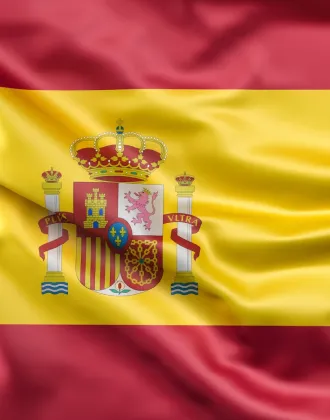
Crypto license in Gibraltar
Thanks to the flexible structure established by the Gibraltar regulatory body, Gibraltar is an ideal place to obtain a cryptocurrency license. Opportunities are provided here for initial coin offerings, the operation of cryptocurrency exchanges, and wallet providers. In addition, Gibraltar holds a strong reputation in the blockchain community as a leading jurisdiction for registering blockchain-related companies. Gofaizen & Sherle offers its expert support in the process of registering and obtaining cryptocurrency licenses not only in Gibraltar but also in other legal jurisdictions
Gibraltar is a popular international tax haven with a well-developed financial infrastructure including banks, insurance companies, and investment funds. This makes it a profitable place to do business and invest.
Gibraltar is unique in its economic model, based largely on its status as an offshore financial services center. The blockchain industry is also currently active in this area, and Gibraltar’s regulatory body has issued a significant number of licenses to blockchain operators. Some of the most prominent cryptocurrency exchanges and primary coin offerings in the world have chosen Gibraltar as their jurisdiction for licenses. The list of licensed companies includes several major cryptocurrency trading platforms. These include Huobi, which is the fourth largest exchange by trading volume, and Coinfloor, the oldest cryptocurrency trading platform in the UK.
Gibraltar has a specialized legislative framework that regulates cryptocurrencies and blockchain businesses. It provides legal clarity, investor protection, and compliance with anti-money laundering (AML) and customer identification procedures (KYC). Gibraltar’s regulatory body, the Financial Services Commission (GFSC), oversees compliance with these laws and standards.
Gibraltar has a favorable environment for commercial activity, including low tax rates and tax incentives for cryptocurrency companies. This makes the country attractive for fintech companies and cryptocurrency projects. In addition, cryptocurrencies are regulated and recognized as a means of payment alongside regular fiat money in Gibraltar. Exchanges, cryptocurrency exchanges, token issuance, and initial coin offerings are allowed in the country.
Currently, according to CoinMarketCap, the daily global bitcoin trading volume exceeds 20 billion dollars. Thanks to Gibraltar’s simplified and cost-effective process for obtaining a cryptocurrency license, you can join this lucrative market in as little as three months.
In the context of increasingly complex cryptocurrency regulation in key economic countries such as the United States and the European Union, Gibraltar offers a cost-effective and risk-free alternative for launching a licensed cryptocurrency exchange or conducting broker-dealer activities.

Find more information about the crypto license in Gibraltar
Advantages of obtaining a cryptocurrency license in Gibraltar
1. Well-defined regulatory structure
Gibraltar has developed a robust regulatory structure specifically tailored for cryptocurrencies and blockchain-based businesses. This structure provides clarity and legal certainty for cryptocurrency-related activities and ensures compliance with anti-money laundering (AML) requirements and customer identification procedures (KYC).
2. Low tax regime
Gibraltar has a favorable tax regime for crypto businesses, which can help reduce your company’s costs. The corporate tax rate is only 12,5%, which creates a favorable environment for profitability and growth. In addition, there are no taxes on capital gains and dividends, making Gibraltar a tax-efficient jurisdiction for cryptocurrency companies.
3. Strong infrastructure
Gibraltar has a strong infrastructure to support crypto-business, including banks, lawyers, and accountants familiar with the sector.
4. Strong investor protection
Gibraltar’s regulatory structure emphasizes investor protection, including strict capital requirements and proper governance systems. This inspires confidence in potential investors, attracts capital, and promotes growth in the cryptocurrency sector.
5. Innovative ecosystem
Gibraltar has a vibrant and innovative ecosystem for blockchain and cryptocurrency companies. The jurisdiction actively encourages innovation by providing support and resources for the development of cutting-edge technologies and projects.
6. Various expansion opportunities
Obtaining a cryptocurrency license in Gibraltar opens up opportunities for expansion and access to a large customer base within the EU.
Crypto license lawyers in Gibraltar
Gibraltar cryptocurrency regulation
In 2018, Gibraltar became one of the first jurisdictions to adopt and implement the Distributed Ledger Technology Framework (DLT Framework), which provides licensing requirements for cryptocurrencies and other blockchain-based businesses. Today, Gibraltar continues to actively develop legislation to ensure the integrity of crypto-businesses and encourage the development of blockchain-based products and services.
The Financial Services Act passed in 2019, is the primary legislation regulating cryptocurrency companies in Gibraltar. This law establishes 10 principles for the regulation of crypto-businesses and requires all DLT providers to conduct their economic activities in good faith to maintain the continuity of the market’s reputation.
Under the Financial Services Act, cryptocurrency companies must obtain a license from the GFSC to operate in Gibraltar. A DLT Provider license is a license issued under Section 8 of the said Act to conduct the controlled activity of providing distributed ledger technology services. The process of obtaining a license involves a thorough assessment of the business model, security measures, and compliance procedures. In Gibraltar, the following cryptographic activities are subject to licensing:
- crypto asset exchange or exchange services;
- crypto asset management services;
- crypto asset wallet providers;
- token issuance and management services;
- crypto asset advisory services.
Despite Gibraltar’s withdrawal from the European Union with the UK, its anti-money laundering (AML) regulations remain aligned with the EU’s Fifth and Sixth Anti-Money Laundering Directives (AMLD5 and AMLD6). This means that DLT businesses in Gibraltar must comply with requirements such as the proven competence of senior management and the implementation of customer due diligence (KYC) procedures and other internal policies aimed at identifying and mitigating risks associated with customers and their countries of domicile.
In addition to specific cryptocurrency regulation, cryptocurrency transactions in Gibraltar may also be subject to other relevant laws and regulations, including:
- Proceeds of Crime Act (2015, updated March 2021). The law regulates anti-money laundering and counter-terrorist financing measures by requiring cryptocurrency companies to implement robust anti-money laundering procedures and customer identification procedures (AML and KYC) to prevent illegal financial activities.
- Data Protection Act (2004, updated October 2019). Cryptocurrency companies must comply with the Data Protection Act to ensure the privacy and security of personal data collected and processed as part of their operations.
- Companies Act (2014, updated January 2022), which governs the registration, management, and reporting requirements for companies operating in Gibraltar.
- Consumer Protection Legislation. The Consumer Protection Regulation ensures that customers are adequately informed and protected when transacting in cryptocurrency or using cryptocurrency services.
- Intellectual Property Regulation (2021). Cryptocurrency companies may be interested in considering intellectual property laws when developing and protecting their technology, trademarks, or other intellectual assets.
It is important for cryptocurrency companies operating in Gibraltar to comply with the relevant laws and regulations applicable to their specific activities. The Gibraltar Financial Services Commission (GFSC) and other regulatory bodies monitor and enforce compliance with these laws to ensure that the cryptocurrency ecosystem in Gibraltar is secure.

Request more information about the Gibraltar Crypto License
Company registration in Gibraltar
To apply for a DLT provider license, company registration in Gibraltar is required. One or more foreigners can set up a private limited company, choosing this as the most common legal business structure.
This requires registering the company with the Gibraltar Registration Chamber, which usually takes about a week. The authorized capital of the company is determined based on a business plan.
The documents required to register a company are:
- articles of Association of the company;
- a detailed business plan including financial projections;
- identity documents (passport or other identification document) of the founders and directors;
- a document confirming the address of residence (e.g. bank account statement or utility bill received within the last three months);
- a power of attorney if the company is established remotely.
Requirements for a private limited company that plans to engage in DLT-related activities in Gibraltar include:
- Having at least one shareholder of any nationality, with no residency requirement in Gibraltar.
- Appointment of at least one director of impeccable reputation who will actively participate in the company’s business activities, with no residency requirement.
- Opening a corporate bank account with a local bank.
- Hiring at least two employees in Gibraltar, one of whom must be a key employee who is not a director.
- Hiring a company secretary.
- Establishment of a business website.
- Having an operating platform.
- Having a registered office in Gibraltar.
If the documents are not in English, they must be accompanied by a notarized translation.
Obtaining a crypto license in Gibraltar
The standard procedure for obtaining a GFSC crypto license includes:
- Preparing and submitting an application, which should contain all necessary information about your company, including a business plan, description of operations, financial information, and compliance policy.Information about the competence of the founders and directors must also be included. Each founder and director of the company must provide:
- a certified copy of proof of identity;
- a certified copy of proof of residence (e.g. utility bills);
- a certified bank statement;
- two professional letters of recommendation;
- proof of source of funds;
- certified proof of no criminal record;
- CV showing previous employment;
- certified copies of educational diplomas.
- Your company must meet certain requirements set by the GFSC. This may include verification of the reputation and goodwill of the company’s directors, verification of financial performance, and verification of compliance with anti-money laundering and anti-terrorist financing measures.
- Documentation preparation. You will need to provide various documents including articles of association, governance and management information, business model descriptions, compliance systems, and other required documents.
- Payment of fees associated with processing the license application.The fee for obtaining a crypto license in Gibraltar depends on the complexity of the business you plan to operate. For example:
- crypto asset advice – £5,000 (approximately USD 6,555);
- simple blockchain projects (crypto asset wallet, token issuance, token management) – £10,000;
- ICO projects – £20,000;
- crypto asset management – £25,000;
- crypto exchange operator – £30,000;
- crypto asset exchange – £50,000.
The license must be renewed annually.
In addition, there are application fees, inspection fees, registration fees, and several other fees that are paid during the licensing process.
- Review and consideration of the application, including verification of information provided and consideration of eligibility.
- Issuance of a crypto license in Gibraltar. Typically, a license is issued within 9-12 months.
It is important to note that specific requirements, procedures, and fees may change over time. Therefore, it is recommended to contact the GFSC directly or the legal advisors at Gofaizen & Sherle for the latest information and guidance on obtaining a license.
Gibraltar Crypto Tax
Gibraltar does not levy a specific tax on cryptocurrencies. However, cryptocurrency companies in Gibraltar are still required to adhere to general taxation principles and pay the general taxes imposed by the Internal Revenue Service.The tax year in Gibraltar runs from July 1 to June 30, and tax returns must be filed accordingly by the due dates.
Gibraltar is renowned for its low taxation and offers certain tax advantages to cryptocurrency businesses. For example, Gibraltar does not impose taxes on capital gains, interest, and dividends. As of April 1, 1997, Gibraltar also discontinued the estate duty.
In addition, Gibraltar’s taxation system does not include value-added tax (VAT). Corporate tax in Gibraltar is governed by the Income Tax Act 2010 and applies to profits derived from income accumulated and earned in Gibraltar. For companies in the cryptocurrency industry, the corporate tax rate is 12,5%.
Under the Social Security Act 2021, all cryptocurrency companies registered in Gibraltar are required to make weekly social security contributions regardless of the location of their employees, as long as they are registered with the Employment Service. Contributions range from £28 to £50 per week ($37 to $66).
The social security exemption applies in the following cases:
- the employee is also working elsewhere in Gibraltar and their contributions are fully covered by the other employer.
- the employee holds a valid A1 certificate issued by another country in the European Economic Area where their contributions are paid.
- for start-ups with up to 20 employees and small companies with up to 10 employees, there is a credit of £100 (approximately $131) per employee in the first year towards social security.
Stamp duty applies to the transfer or sale of real estate situated in Gibraltar or shares in a company that owns real estate in Gibraltar and is based on the market value of the real estate. Stamp duty rates vary depending on the value of the property.
Gibraltar currently has only one international Double Taxation Agreement signed with the UK. However, companies can take advantage of relief on foreign tax that has already been paid. A Gibraltar resident who receives income subject to tax in Gibraltar and derived from another jurisdiction where tax has already been paid is entitled to a unilateral exemption in Gibraltar from taxation of that income. The amount of the exemption is equal to the tax already paid or Gibraltar tax (the lower value is chosen).
It is important to note that tax legislation is subject to change and it is recommended that you seek advice from a tax professional to obtain up-to-date information on the applicable tax rates and rules in Gibraltar.
FAQ on obtaining a crypto license in Gibraltar
Is cryptocurrency legal in Gibraltar?
Cryptocurrency is legal in Gibraltar. Gibraltar has implemented a regulatory framework for cryptocurrency businesses requiring a license from the Gibraltar Financial Services Authority.
How do I get a crypto license in Gibraltar?
To obtain a cryptocurrency license in Gibraltar, you need to set up a company in Gibraltar, prepare the necessary documents, meet the regulatory requirements, apply for a license, and continue to comply with the relevant regulatory obligations once licensed.
How long does it take to get a crypto license in Gibraltar?
The time to obtain a cryptocurrency license in Gibraltar can vary depending on various factors, including the completeness and accuracy of the application, the complexity of the business model, and the responsiveness of the applicant during the regulatory review process. The process typically takes around 9-12 months.
How long is a cryptocurrency license issued in Gibraltar?
A cryptocurrency license issued in Gibraltar is usually valid for one year. After this period, the license can be renewed annually, subject to compliance with the regulator’s requirements and payment of renewal fees.
What are the KYC and AML requirements for obtaining a Gibraltar crypto license?
These regulations are designed to prevent the use of cryptocurrency services for money laundering, terrorist financing, and other criminal activities. The AML and KYC rules require companies to collect and store information about their customers, including their names, addresses, phone numbers, and dates of birth. Companies must also conduct identity checks on their customers to ensure that they are who they say they are. Companies must also have a system of internal controls that allows them to identify and report suspicious transactions.
Companies that fail to comply with AML and KYC regulations can be fined or even have their license revoked.
Explore other Crypto Licences
Connect with our experts
Our experts will tell you how to do it as quickly and easily as possible.
By clicking the button, I confirm that I have read the privacy policy and consent to the collection and processing of my personal data in accordance with the GDPR rules.
to our news & insights



















